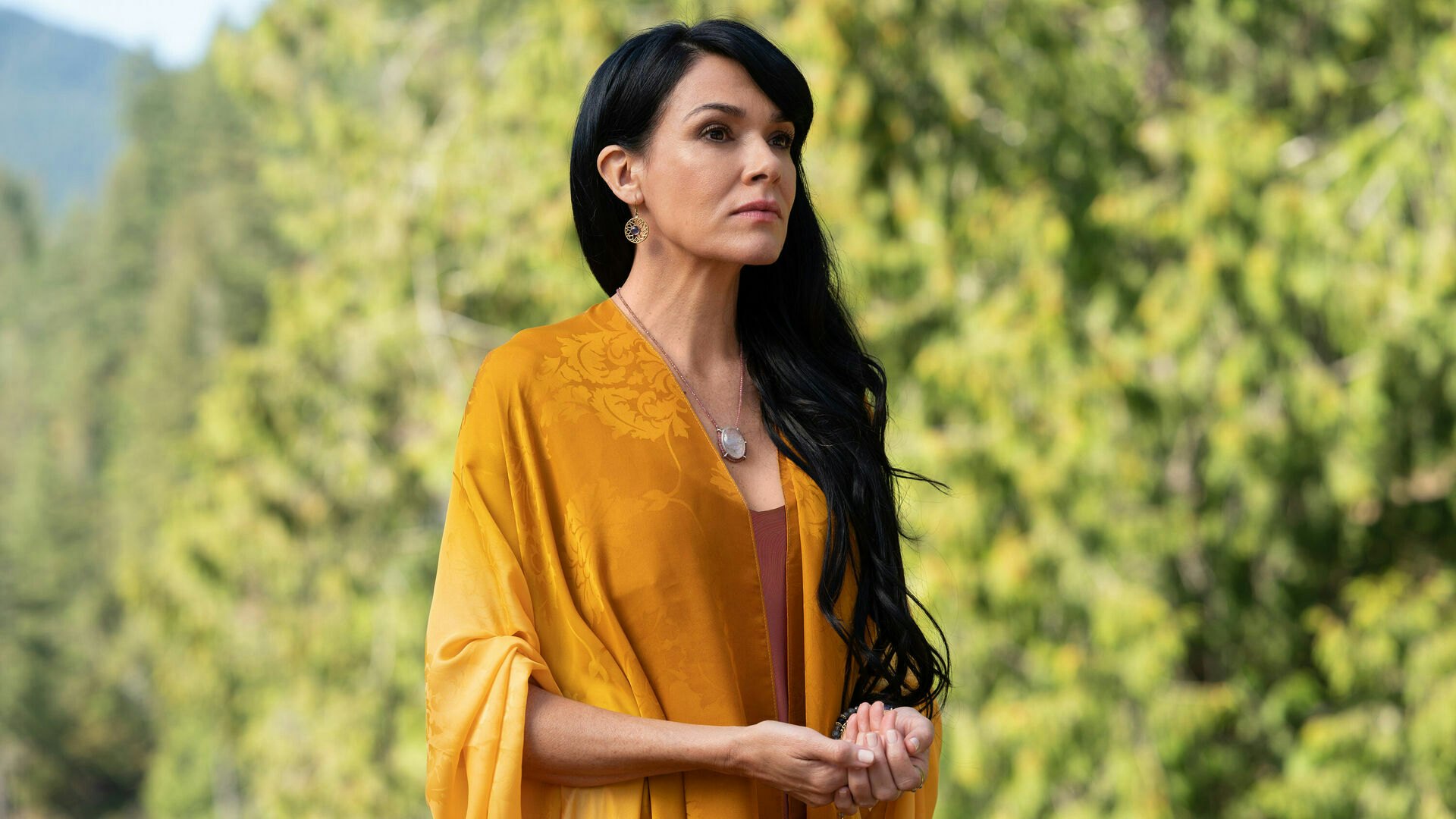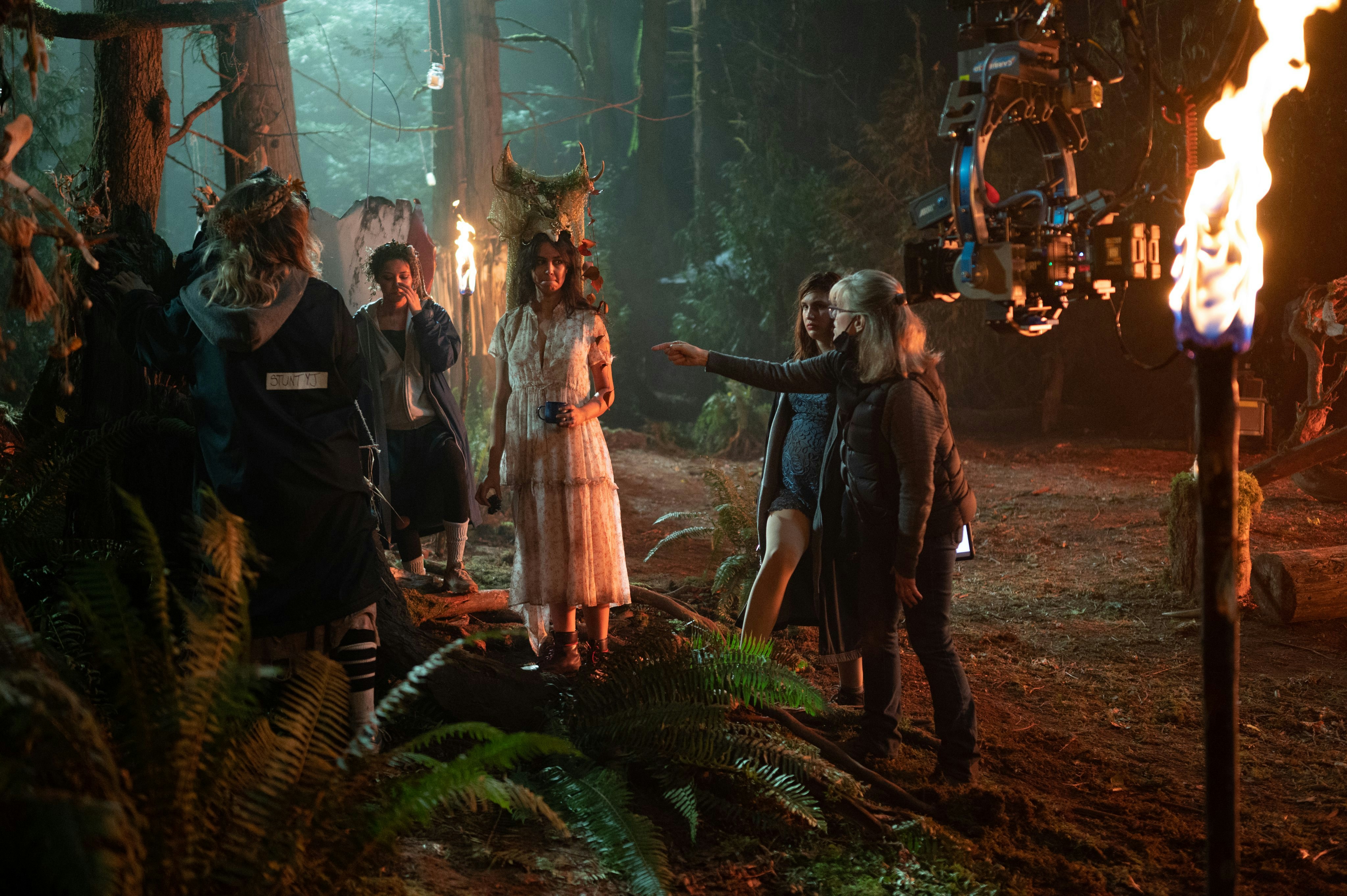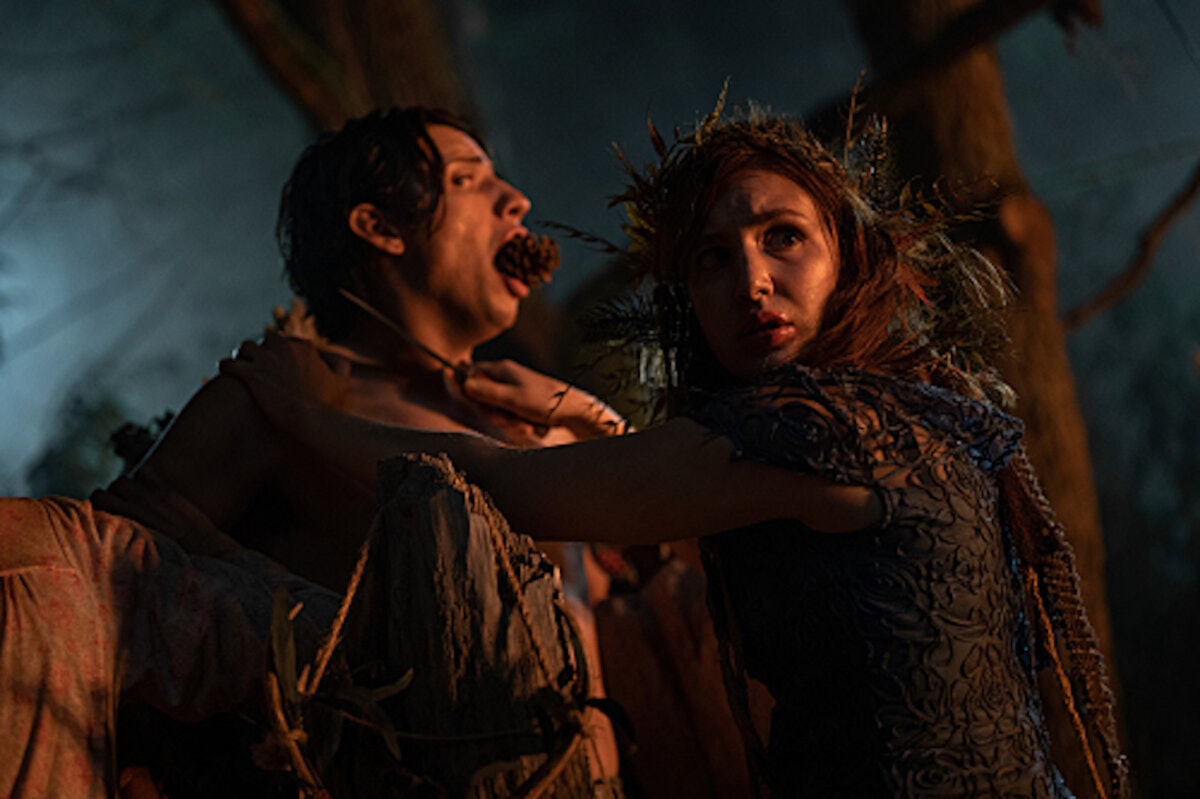
Daisy Von Scherler Mayer was tailor-made to direct Yellowjackets.
After starting out her career with two different iconic movies about girlhood (teen cult classic Party Girl and 1998’s Madeline), she became a journeyman director, directing standout episodes of television across multiple series. The episode of Mad Men where Don gets mugged by teens? That was her. The episode of Inventing Anna guest-starring Kate Burton? Also her work.
Yellowjackets gave her the opportunity to harken back to her filmmaking start, but more importantly, it was something never seen before on TV. “I just want material where I'm filming scenes I've never filmed before,” she tells Inverse. “When you've done a lot of work and you have a big body of work, you're like, ‘No, I don't wanna do that same thing.’”
After directing the penultimate episode of Season 1, “Doomcoming,” following the group of survivors as they throw an end-of-year party with a disastrous end, she was brought back for two episodes of Season 2: the now-streaming premiere and Episode 8 — following up “Doomcoming” with another penultimate slot.
Inverse spoke to Mayer about her career, “Doomcoming,” working on Season 2, and what fans should look forward to in Episode 8.
This conversation has been edited for clarity and/or brevity.

How do you go from a ‘90s movie director to a director of TV set in the ‘90s?
I know, isn't that funny? I've been working the whole time. Jamie Babbit, who directed But I'm a Cheerleader, another ‘90s empowerment film, wrote me recently and said, “well, we're having our Criterion comeback.” Neither of us is really having a comeback. Jamie's been working the whole time, I've been working the whole time.
The sparkle dust of everything that happened around Sundance when Party Girl came out was great. Then I spent some time trying to be a writer-director and then pivoted when I realized that I just didn't like writing that much. Sometimes you just have one great song in you or one great album. I wrote Party Girl with a friend and I just wasn't sort of able to continue the writer-director path.
Once I discovered TV, it was a really good fit. I just enjoyed working on it. A lot of the time in film, development and getting stuff made is like hitting your head against the wall. When you do a TV show, boom, you direct it, it's on the air a couple of months later, and then you're onto the next thing, and you meet so many people. I fell in love with it and I was very lucky to have started making that transition just as there was quality TV, but there wasn't this absolute juggernaut of amazing material and amazing writers like now.
TV now is what indie film was in the ‘90s. It was this great time, when I came in it was like Steven Soderbergh, Jim Jarmusch, Gillian Armstrong, just these amazing voices that were so different and original.
“It's real, but of course it's not real”
Now we have that, but it's on streaming and it's on cable television. When I started out, I did Halt and Catch Fire and Mad Men. I just like original material and boy, is Yellowjackets original material.
What drew you to Yellowjackets as a project?
The hardest thing to do as a director is a difficult tone. A tone that shifts and that asks, “Is it comedy? Is it black comedy?” It's definitely not camp. It's grounded, it's real, but of course it's not real. These people are murdering people and eating them. It’s cannibalism. That is such a challenge.
Ashley, Bart and Jonathan, the writers, created this world where every scene has that challenge, and I love that. I love anything that plays with perception so that in the filmmaking, if you watch it a second time, you can say, “I saw that thing one way, now that I have new information, I can look back and see another.”
Like how Shauna talks to a dead body in Episode 1?
Yes! Or even like, Jeff is one of my favorite characters. When you find out that Jeff had read Shauna’s notebooks, he suddenly goes from in your mind being a complete idiot to like, whoa, this guy, he knew, but he stayed with her. He's twisted, he's messed up too. He never confronted her. I thought that was a great reveal last season.
The real answer to how I ended up on Yellowjackets is that Jonathan Lisco, was a showrunner on Halt and Catch Fire, and Karyn Kusama and I were both directors on that. So Karyn and I met and I always bond with other directors when we're working back to back. So they contacted me.
I was actually really exhausted when they got in touch with me to do Yellowjackets. I was doing this show Y: The Last Man, which I thought was gonna be like the big show. I was like, I'm gonna be on this for years. I love that show and I was really disappointed, I don't think it got a fair shake at all. The cast was phenomenal.
Jonathan wrote me a very nice letter saying “We really want you to do this, come on.” And then I was like, “Oh, I'm flattered. Okay.” I'm so thrilled because it's just such a great cast and once I read the script I was like, of course I'm doing it.

“Doomcoming” has been heralded as one of the best episodes of Season 1. How did you approach the weird balance between glee and dread?
You have to commit, you have to make a strong choice and commit. When I read the script, I said, to Trevor Forrest, the cinematographer, “We are transitioning this show into what Karyn established in the pilot, which is crazy cult cannibalism. Something happens and this is the episode where that transition has to take place and visually we have got to make some strong choices. What can we do lens-wise?”
A lot of the existing weird lenses that you would use don't exist for the anamorphic frame ratio that they were filming on. I gave him that task before I even arrived, and he ended up taking actual glass and painting on it. We had different levels of weird lenses that would twist the images.
“We were just throwing as much at it as we could to heighten the experience.”
Then when we got on set, it was just all hands on deck. You never have a lot of time for prep. When they say in the script the girls turn into monsters, there's not a pre-vis of CGI that’s been worked on for seven months like you have on your Marvel stuff. This is like, what are we doing next week? We're filming this very soon. Hair, makeup, wardrobe, prosthetics, all got involved.
It was really exciting to show how they have to go into a different state. To me, that was the most challenging thing, because those girls would not attack Travis. They would not kill Travis if they were in their right mind. We were just throwing as much at it as we could to heighten the experience, because to me the key was being able to sell that they are not themselves and not have it feel forced.
One of the things that was just kismet was that the original script all took place at night and I said, I refuse to do five hours of what we call graveyard shifts because we don't do our best work in the dead of night. So Trevor ended up faking twilight with a giant scrim and we were in the woods so already we were covered, so there's a weird artificiality, I think, to the dusk quality of the beginning when they come into the party. I feel like that really enhanced the trippiness, how the light is flat but it's a little orangey.
Sometimes you do go into shows and contribute because you really feel like the scenes aren't going to play. But for this, the question wasn’t if they were going to play, but are we gonna execute the Simone Biles weird turns and shifts and flips that they do? I was really happy it turned out so well.

You were responsible for the first episode of Season 2. There's so much riding on that second season premiere, so how did you handle directing that? Was there any pressure?
It's always a lot of stakes when you're in a sophomore season of anything, but everybody was very aware and open about that. We didn't know if we could recreate it. I have such respect for everybody involved and I think we all knew what worked last year. The first year nobody knew if it was all going to work. The second year it was like, we know it can work, let's put it that way.
I think the hardest thing is just servicing so many characters and so many storylines. And especially the first episode had a lot. That was just technically difficult because you're accomplishing a lot in a short period of time. But those actors bring it, there's not a lot of process going on. They bring it, they're amazing. It was nice to change some things: cinematically, it's not as handheld, we're not out in the forest running. Winter has set in and there's to me more of a Hitchcock[ian], creepy vibe in the cabin as opposed to the frenetic stuff of falling in the woods.
Speaking of being in the woods, what was it like filming now that winter has fully set in? Did that make things more difficult?
It's all about getting your cold-weather gear. It's difficult, but it's also different, and I love that about Season 2. This isn't a sitcom. We're not trying to create the formula every time, we can mess with the formula. At the premiere the other night, Jonathan Lisco made an amazing speech where he said, “We will not let fear guide us. Fear can be in the script, the characters can have fear, but we are going to creatively always try and do new things. And if they like it, they like it, they don't, they don't, but we're gonna be inventive.”
“I think there is a universal boredom.”
I think having them stuck in winter is a great shift to their relationships. And then in the present day, it's almost the opposite. Things are bubbling up in that suburban “everything's fine” tone. Now all those main characters are in the throes of dealing with things: Taissa, especially, is a great example, and Jeff now knowing, and Callie knowing — there's a lot going on in the present day that is more on steroids. The past is more terrifying in a different way.
What can you tell me about Episode 8, the penultimate episode of the season, that you’re also directing? How will it compare to “Doomcoming”?
These creators know what they're doing and they purposely said, “What's the ‘Doomcoming’ version of this season?” So it's not the same, but it definitely has the same propulsive quality and the same “chase to the curtain” as we'd say in the 1930s. There are a lot of similarities. It's intense. I love that episode. I was really excited to get it and to get the opportunity. Everything is gonna change and take a really propulsive turn and we’ll see where that leaves us to tee up Season 3.
What has it been like watching the slow and then very fast growth of the Yellowjackets fandom?
I think we've spent so many years watching the same stories with the same types of people in the same roles. I think there is a universal boredom. When something comes around and makes people say “whoa, I haven't seen that before.” It's not so much just happy, like, “yay, I'm working on something successful,” but I'm working on something where there’s a freshness: I have not seen this character before. I have not seen an adult woman at this age having these kinds of feelings before or this kind of twisted messed up story.
There are so many roles where I see someone on screen, the middle-aged woman or whoever it is, and I'm like, “There she is doing that scene again. Boy, have I seen that scene a million times.” To me, the success of Yellowjackets really is proof there are other stories to be told, and if we tell them with fierceness and originality, you will find all the people will come out of the woodwork.






